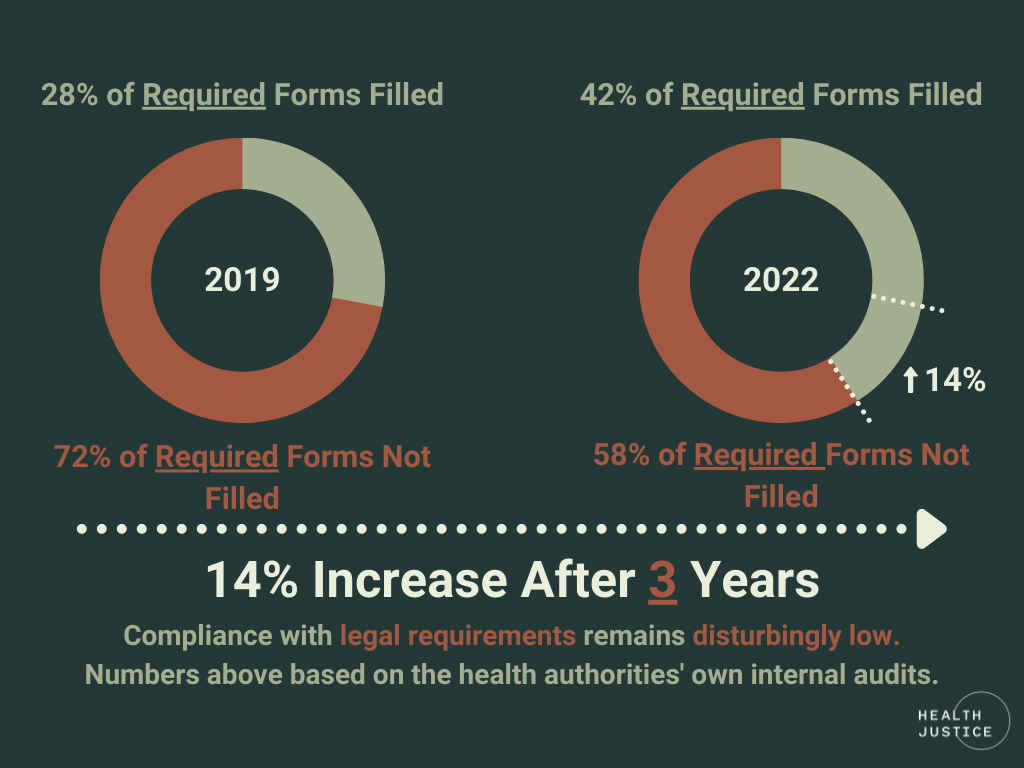Ombudsperson released Investigative Update on Involuntary Treatment in BC
“It’s people’s human rights, but it doesn’t seem to be on anyone’s radar.”
Recent calls for additional powers authorizing mandatory treatment after drug poisonings/overdoses raise a question: how is BC’s current involuntary treatment system working?
On July 26, BC’s Ombudsperson released a Systemic Investigative Update to assess the province’s progress in implementing the recommendations made in his 2019 report, Committed to Change: Protecting the Rights of Involuntary Patients under the Mental Health Act.
The 2019 report found that the power authorized under the Mental Health Act, which includes detention, forced administration of psychiatric treatment without consent, and the use of disciplinary powers like seclusion and restraints, constituted an “extraordinary state power with little oversight or accountability.” The investigation revealed that hospitals and facilities detaining and treating people involuntarily were failing to comply with the legal requirements and procedural protections set out in the law.
The report made 24 recommendations to ensure that people experiencing detention and involuntary treatment under the Mental Health Act no longer have their basic legal rights violated and the legal safeguards set out in the Act are adhered to.
Ombudsperson’s July update found that while health authorities implemented some of the 2019 recommendations, progress has been alarmingly slow. Only one third of these crucial recommendations have been implemented in the three years following the initial report and investigation. This assessment was based on self-assessments completed by health authorities and not an independent investigation by the Ombudsperson’s office.
“These recommendations don’t prevent the ability to detain people – they’re not radical. It’s such needless violations of rights.”
In addition, here are 3 key take-aways from July’s Investigative Update Report:
1. Involuntary admission and treatment have continued to increase at significant rates, while voluntary admission and treatment remains stagnant. This trend runs counter the public narrative that BC need to increase involuntary treatment services, rhetoric that only reinforces stereotypes and stigma about people with mental health-related disabilities.
This graph can be found on page 31 of the Systemic Investigations Update Report. Data from 2018/19 and 2019/20 is missing because of Ministry of Health data reporting changes.
2. Compliance with legal requirements remains disturbingly low despite three years of work and resources put towards improving compliance rates. Overall, completing the required forms went from 28% to 42% based on the health authorities’ own internal audits.
In addition:
Completion of the initial Form 4s (certificate for involuntary admission) to detain people went down from 99% in 2019 to 97% (see Figure 3 in Appendix B, page 32)
Fraser Health Authority and Northern Health Authority have markedly the highest rates legal non-compliance (see Figure 4 in Appendix B, page 33)
Only 5% of Form 5s (consent to treatment) and Form 13s/14s (notification of rights) were fully completed in the Northern Health Authority based on quality indicators (see Figure 6b and 7b in Appendix B, page 35 - 36)
“What does it take to comply? Clearly the idea of violating people’s rights isn’t important enough on it’s own. There has to be consequences for the failure to comply with the law.”
3. The Report raises several concerns with the way Bill 23 structures BC’s new independent rights advice service, emphasizing that “it leaves substantial issues remaining for government to address”:
The Ombudsperson recommended establishing the service through Legal Aid BC, which would mean the Ombudsperson’s office would have oversight over the service, an approach that aligns with other provinces. BC’s plans to contract with a private service provider may undermine the ability to provide independent oversight of the service and ensure accountability.
The service is currently request based rather than automatic upon detention, which the Ombudsperson noted is concerning.
The wording of Bill 23 suggests the service may be more akin to an info and referral service, not a substantial advocacy service that helps people exercise their rights, which is what the Ombudsperson has identified as needed.
Our Thoughts
Health Justice remains steadfast that the powers granted under the Mental Health Act are immense and have serious impacts on the rights and dignity of people who experience involuntary treatment and must come with the strongest accountability and oversight measures. It is incredibly concerning that in three years, so little progress has been made to ensure the current legal requirements set out in the Act, which are in dire need of strengthening and reform, are respected.
BC’s ongoing failure to respect legal rights has real consequences and can harm the health and wellbeing of the people who experience them. As the Ombudsperson of BC stated, “It’s time mental health facilities started complying with the law all the time rather than only sometimes.”
We will continue our advocacy for reforms to the Act and accountability with the current law. We welcome the opportunity to support BC as it works to ensure that the mental health system respects human rights.
Update: When this post was first published we got some numbers wrong. Originally we had stated there was 29 recommendations when there was 24. As well, we had noted the amount of required forms completed as going from 28% to 41% when it was supposed to be 28% to 42%, this makes it a 14% increase instead of 13% increase. These numbers have now all been corrected so that they are accurate.



